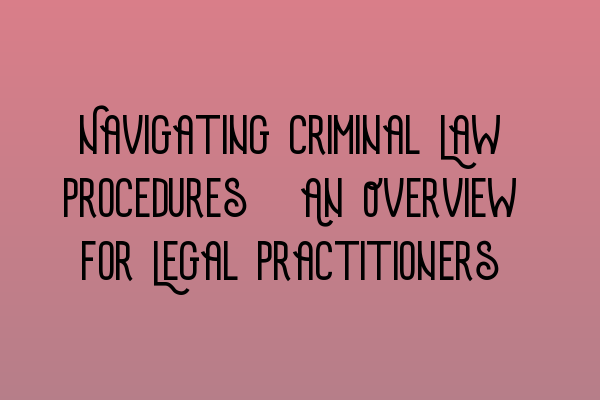Navigating Criminal Law Procedures: An Overview for Legal Practitioners
Welcome to SQE Criminal Law & Practice Law UK, your trusted destination for comprehensive legal solutions. In this blog post, we will provide you with a detailed overview of navigating criminal law procedures, making it easier for legal practitioners to understand the intricacies of the process. Whether you’re a seasoned professional or just starting out in the field, this guide will equip you with the knowledge you need to excel in criminal law.
The Basics of Criminal Law Procedures
Understanding the basic framework of criminal law procedures is essential for any legal practitioner. It begins with the investigation phase, where evidence is collected and analyzed to determine the legitimacy of the charges. Once the investigation is complete, the case moves on to the charging phase. This is when the prosecuting agency formally charges the defendant with a specific crime based on the evidence gathered. After this, the defendant is arraigned and enters a plea, either guilty or not guilty.
Following the plea, the case proceeds to the trial phase. During the trial, both the prosecution and defense present their arguments and evidence before a judge or jury. It’s crucial for legal practitioners to prepare thoroughly for a trial, as this is where their expertise and knowledge can significantly impact the outcome.
Key Stages in Criminal Law Procedures
Pre-Trial Stage
The pre-trial stage is a critical phase where legal practitioners lay the groundwork for the trial. This involves reviewing evidence, conducting legal research, and developing defense or prosecution strategies. It’s important to keep in mind that effective preparation at this stage can significantly influence the direction of the case. Utilizing practice exams and mocks, such as SQE 1 Practice Exam Questions and SQE 1 Practice Mocks FLK1 FLK2, can immensely enhance your understanding and competence.
Trial Stage
The trial stage is the cornerstone of criminal law procedures. Legal practitioners must master the art of presenting persuasive arguments, cross-examining witnesses, and introducing evidence to build a strong case. Preparation plays a crucial role here, and enrolling in SQE 2 Preparation Courses or SQE 1 Preparation Courses can provide you with the necessary knowledge and skills to excel in this stage.
Post-Trial Stage
After the trial stage, the case enters the post-trial phase. This phase involves evaluating the outcome of the trial, exploring potential avenues for appeal, and advising clients on their rights and options. Staying up to date with the latest SRA SQE Exam Dates, such as the upcoming ones mentioned here: SRA SQE Exam Dates, is vital for legal practitioners as it allows them to plan their professional development and stay ahead in their field.
Conclusion
Navigating criminal law procedures can be complex, but with the right knowledge and resources, legal practitioners can maneuver through the system with confidence. At SQE Criminal Law & Practice Law UK, we strive to provide comprehensive support for legal professionals like you. By integrating our SQE 1 and SQE 2 preparation courses and utilizing our practice exams and mocks, you can enhance your skills and stay ahead in the challenging world of criminal law.
